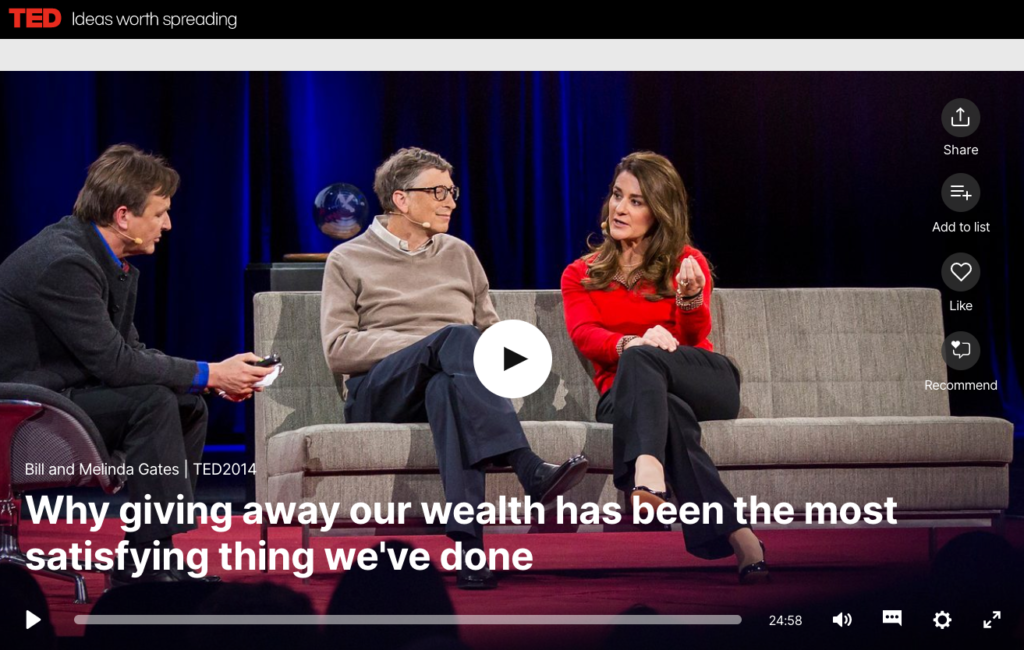No.01
Chris Anderson: So, this is an interview with a difference. On the basis that a picture is worth a thousand words, what I did was, I asked Bill and Melinda to dig out from their archive some images that would help explain some of what they’ve done, and do a few things that way. So, we’re going to start here. Melinda, when and where was this, and who is that handsome man next to you?
Melinda Gates: With those big glasses, huh? This is in Africa, our very first trip, the first time either of us had ever been to Africa, in the fall of 1993. We were already engaged to be married. We married a few months later, and this was the trip where we really went to see the animals and to see the savanna. It was incredible. Bill had never taken that much time off from work. But what really touched us, actually, were the people, and the extreme poverty. We started asking ourselves questions. Does it have to be like this? And at the end of the trip, we went out to Zanzibar, and took some time to walk on the beach, which is something we had done a lot while we were dating. And we’d already been talking about during that time that the wealth that had come from Microsoft would be given back to society, but it was really on that beach walk that we started to talk about, well, what might we do and how might we go about it?
ボキャブラリー
Chris Anderson: So, this is an interview with a difference. On the basis that a picture is worth a thousand words, what I did was, I asked Bill and Melinda to dig out from their archive some images that would help explain some of what they’ve done, and do a few things that way. So, we’re going to start here. Melinda, when and where was this, and who is that handsome man next to you?
Melinda Gates: With those big glasses, huh? This is in Africa, our very first trip, the first time either of us had ever been to Africa, in the fall of 1993. We were already engaged to be married. We married a few months later, and this was the trip where we really went to see the animals and to see the savanna. It was incredible. Bill had never taken that much time off from work. But what really touched us, actually, were the people, and the extreme poverty. We started asking ourselves questions. Does it have to be like this? And at the end of the trip, we went out to Zanzibar, and took some time to walk on the beach, which is something we had done a lot while we were dating. And we’d already been talking about during that time that the wealth that had come from Microsoft would be given back to society, but it was really on that beach walk that we started to talk about, well, what might we do and how might we go about it?
with a difference : 一風変わった、ひと味違った、珍しい、普通と違った
On the basis that: 〜ということに基づいて、という前提で
worth ~: a. 〜の価値がある、〜に値する、〜に相当する
A picture is worth a thousand words.: 百聞は一見に如かず。(その他、Seeing is believing.という表現もある)
dig out : 掘り出す、探し出す
archive: n. 保存記録、ファイル保管庫、アーカイブ、書庫〘バックアップ用に圧縮した保存参照用の文書; ネット上のものもさす〙
With those big glasses, huh?: でっかいメガネの人のこと?(「写真の中の隣のカッコいい男性は誰ですか?」と聞かれて、「でっかいメガネの人?」とふざけている。)
very first: ほんとうに最初の
the first time: 《名詞的に》最初
be engaged (to be married) : 婚約している(「〜と婚約している」は be engaged to ~)
savanna: n. サバンナ(熱帯・亜熱帯地域の草原)
incredible: a. 信じられない、とてつもない、途方もない、最高の
take time off from work: 仕事の休みを取る
touch: vt. 感動させる、影響を及ぼす
extreme: a. 極度の、行き過ぎた、徹底的な
poverty: n. 貧困、貧窮、欠乏、不足
at the end of ~ : 〜の終わり[終端、端]に
Zanzibar: ザンジバル(タンザニア連合共和国に属する)
take time to ~ : 時間を取って〜する、〜するための時間を取る、〜するために時間を割く
during that time: その間に
give back to ~ : 〜に還元する、お返しをする
解説
ビル・ゲイツ:言わずと知れた、MS-DOSやWindowsの開発者でマイクロソフトのトップ。2014年2月4日、マイクロソフトの会長職から退いて「技術担当アドバイザー」。
2000年に妻メリンダと世界最大の慈善基金団体「ビル&メリンダ・ゲイツ財団(Bill & Melinda Gates Foundation、B&MGF)」を創設。途上国のエイズ、マラリア、結核の根絶や教育、識字の水準の改善などに尽力している。
1977年に交通違反を犯したときの写真(ウィキペディアより)




